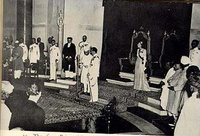
Peggy Noonan wrote an interesting article in OpinionJournal.com based on the old Lapierre-Collins book about Indian independence, partition and sectarian cleansing (March, 23). Interesting how history could turn on simple, often personal, events. Looking back, the partition of the Subcontinent has not been kind to Pakistan- it has been ruled for most of half a century alternately by military dictatorships or corrupt Islamic fundamentalists. Right now it is effectively split between the two forces, and neither seems to be powerful enough to claim absolute control. That seems to make some sense, since the raison d'etre of Pakistan was its separate Islamic identity. I cannot help thinking that India’s original huge Moslem minority (encompassing current Pakistan, Bangladesh, and those Moslems who were wise enough at the time to choose to remain Indians) would have been better off remaining a very influential part of a democratic India.
Lord Mountbatten, was in a hurry to complete the British pull-out, and he did the job as fast as he could. Louis Mountbatten, War Hero, Great Grandson of Victoria, favorite uncle of Queen Elizabeth, survived the bloody end of the Raj. He was killed three decades later by another conflict, ironically a West European sectarian conflict- one to the west across the Irish Sea.
There is no Mountbatten in Iraq today, nor can there be: neither Khlilzad, Negroponte, or Bremer, for all their talents, have been in that mold- the era of such powerful viceroys as Mountbatten and MacArthur is gone. The Iraq situation does not involve a withdrawal coupled with partition and transfer of sovereignty like India. Its own peculiarity also requires a more subtle approach to domestic politics than the one used in Japan.
One mistake of the Iraq War: it seems that the worst possible outcome envisaged at the time was the use of chemical or biological weapons by the Ba'athists. As it has turned out, the worst likely outcome should have been considered as well: a terrorist insurgency drawing on former regime loyalists, Arab Salafi jihadists, and vast amounts of money flowing freely from outside to finance this violent campaign. The sources of the many millions of dollars needed for this extensive campaign are still officially unknown. The goal is to plunge Iraq into open sectarian conflict and draw in other countries in the region. Once the power struggle in Iraq takes on regional dimensions, then the dynamics of the internal balance of power can be changed, actually it will be changed of necessity. Then it will probably spill over across Iraq's border into what Arab politicians these days like to term al-jewar, i.e the neighborhood- sort of a genteel-sounding Middle Eastern version of the 'hood.
Sectarian and religious conflicts have a way of raising (irrational?) passions that are difficult to control- in that respect the world has not changed much. That is an outcome probably many are not expecting in a region noted for its self-delusions. In this explosive case, even turning a blind eye to the flow of funds, materiel and men across borders is not doing the 'hood any good.
Cheers
Mohammed
No comments:
Post a Comment